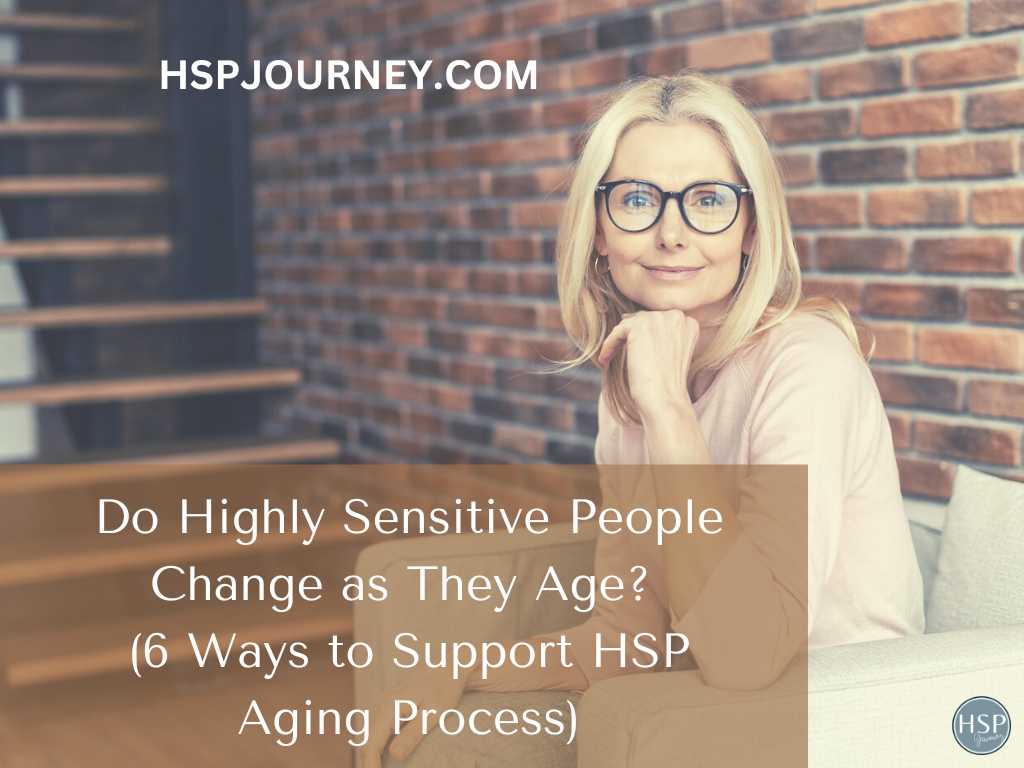As a psychologist, I’m frequently asked if I believe that people can change as adults. Frankly, I don’t think I could have lasted a quarter of a century in this field if my answer weren’t an emphatic YES! Adults can and do change across their lifespans, despite the cliches of the grumpy elder who is stuck in their ways. Let’s look at HSP Aging from the research about adult development and how we can use this information to support ourselves as aging highly sensitive people (HSPs).

Table of Contents
Compelling Research About HSP Aging
There is compelling research that shows that adults grow more conscientious, more emotionally stable, and more agreeable over time. This research found no significant differences between how men and women changed over the 50-year period of the study. While this study did not look specifically at highly sensitive people, the fact that HSPs make up 20-30% of the population makes it highly likely that they were a part of this research. Moreover, most of us would probably agree that the world and each of us individually benefit from people becoming more conscientious, emotionally stable, and agreeable. So much for the idea that aging is all bad.
A 2019 Japanese study sought to explore how adults changed in traits that are specific to highly sensitive people: low sensory threshold (being unpleasantly aroused by external sensory stimuli); ease of excitation (becoming overwhelmed by internal and external demands); and aesthetic sensitivity (responsivity to beauty, art, music, and other aesthetic stimuli).
HSP Aging Research Takeaways
The study found that in both men and women, low sensory thresholds and ease of excitation decrease linearly with age, while aesthetic sensitivity increases linearly with age. In other words, HSPs become steadily less overwhelmed and unpleasantly aroused by the world around them as they get older. They also become more aware and appreciative of aesthetics as they age. These, too, seem like great things to know as an HSP, especially if we are currently struggling to manage our lives and feel connected to beauty or awe.
There is one cautionary tale within the literature that is worth heeding: low sensory threshold can prematurely age us on a biological level. A 2023 study of adolescents found that HSPs with low sensory thresholds had telomeres that were significantly shorter than their peers. Telomeres are sections of DNA that shorten naturally as we age but also shorten in response to stress, trauma, or illness.
It seems that the unpleasant arousal that people with low sensory threshold experience registers as stress that contributes to telomere shortening. Thus, it seems likely that learning to raise one’s sensory threshold over time is important to help slow down our biological aging as HSPs.
6 Tips to Use This Research to Support Your HSP Aging Process
HSP Aging Tip #1 – Don’t Stay the Same
Recognize that you will not stay the same for your entire life. Embrace the fact that your sensitivity is evolving as you grow, experience the world, and learn to thrive. Notice what you might experience differently now than you did 10 or 20 years ago. For instance, maybe you are less bothered by hunger or feel less pressured to please other people. Celebrate the ways that your growth adds to your life now and see if you can set goals for how you’d like your sensitivity to change in the future.
HSP Aging Tip #2 – Try Things You Didn’t Like in the Past
Try things again. Maybe you didn’t like going to concerts as a young adult but would be less stressed by the noise and crowds now. Perhaps you might find yourself enjoying a tour of an art museum or a botanical garden that would hardly have interested you in your youth. Experiment with trying new things and retrying old ones. You might be surprised how your tastes have evolved.
HSP Aging Tip #3 – Adjust How You Do Things
Adjust how you do things. Having a low sensory threshold is biologically stressful. Take note of what helps to reduce sensory stress and ease of excitation. Pad your schedule so that you have transition time between activities. Invest in devices to help you manage your responsivity to the environment, like blue light glasses, quality ear plugs, or a weighted blanket. Use your growing conscientiousness to develop routines and rituals that help you avoid hunger, fatigue, stiffness, and other physically taxing states that make you more likely to feel unpleasantly stimulated or over-aroused. Make a commitment to regularly nurturing your aesthetic sensitivity in whatever ways are restorative and inspirational to you.
Looking for HSP Tools to Thrive in a Chaotic World?
The modern world is often overwhelming and stressful for those of us with sensitive nervous systems. Many of us have suffered from the challenges of high stress, anxiety, sensory overload, and mental health and physical health issues. Fortunately, after years of working with and researching Highly Sensitive People (HSPs), Julie Bjelland has developed many tools that have not only helped her but thousands of HSPs all over the world move out of survival mode living and into thriving. In this free webinar, she’ll share the tools that HSPs have found the most life-changing. Her goal is to help you live to your fullest potential because the world needs you.
Join this free webinar and get tools to help you thrive as an HSP!
HSP Aging Tip #4 – Root Yourself in Community
Root yourself in a community of HSPs of various ages. HSPs tend to isolate themselves and see themselves as unacceptable if they are not part of a community of similar people. Getting the chance to receive support and mentoring from HSPs who are older and/or more experienced can help ease the stress of not fitting into the mainstream. Furthermore, when we are part of a community, we can pass this mentoring along and support others who are not as far along on their HSP journey. Altruism and connection are good for our bodies and our spirits.
HSP Aging Tip #5 – Take Care of Your Body
Take especially good care of your aging body. HSPs can be more vulnerable to the effects of illness, injury, and the wear and tear of time. We may be more likely to have side effects from medications and treatments. Preventing illness and injury should be our first goal. Do the “boring” tasks of self-care: drink enough water, eat relatively well, move your body, stretch your mind and your emotions, nurture your relationships and spirituality, get regular checkups (including vision and dental), take vaccines if you are able, and generally follow the recommendations of your medical providers. Supporting your body in these ways can help you increase your sensory threshold and decrease your ease of excitation.
HSP Aging Tip #6 – Embrace Who You Are
Embrace who you truly are. As we age, we (hopefully) lean into accepting who we are. You might realize you’re just not a cat person, you don’t like reunions, and you can’t get enough reality television to distract you before bed. Be yourself. Unapologetically. And embrace your sensitivity. It isn’t going away, so you might as well stop struggling to get over it and learn to use it to serve your life goals.
Don’t Be Afraid of Aging as a Highly Sensitive Person
My message to aging people everywhere is this: Don’t be afraid of aging, in general, or as an HSP. Don’t give in to pessimism or stereotypes about the horrors of getting older. Life continues to blossom and grow more beautiful as we learn to appreciate it, manage our sensitivity triggers, and lean into the ways that we are developing into our older selves. There are so many reasons to celebrate being an aging HSP. I hope you’ll discover and embrace yours!
Be sensitive, be free
*This post contains affiliate links and I will be compensated if you make a purchase after clicking on my links*





[…] also shared some of my ‘jack of all trades’ interests. As I’ve written more on sensitive people, I started wondering, is there a connection between being highly sensitive and being a […]